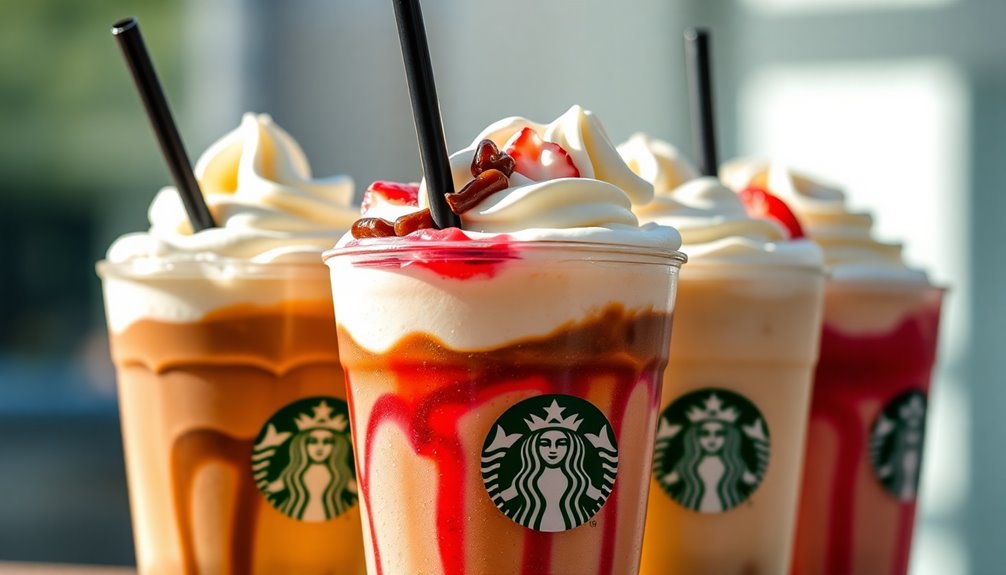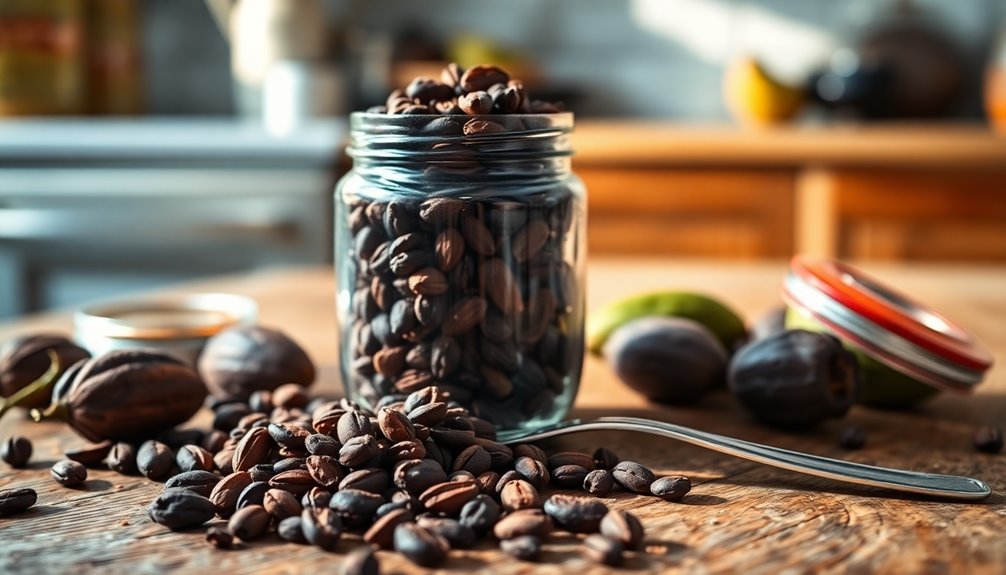Coke Zero has about 34 mg of caffeine per 12 oz can, which is less than the 95 mg typically found in an 8 oz cup of coffee. So, if you're looking for a lower caffeine option, Coke Zero is a solid choice. While it provides a nice boost without the calories, it's still important to keep your overall caffeine intake in check. Remember, everyone's tolerance varies, so find what works best for you. There's plenty more to explore about the differences in caffeine content among various beverages and their effects on your body, too.
Key Takeaways
- A 12 oz can of Coke Zero contains approximately 34 mg of caffeine.
- Regular Coke has about 39 mg of caffeine per 12 oz can.
- Diet Coke contains around 46 mg of caffeine in the same serving size.
- Brewed coffee averages 95 mg of caffeine per 8 oz cup, significantly higher than Coke Zero.
- Coke Zero has about 2-4 times less caffeine than brewed coffee.
Overview of Coke Zero
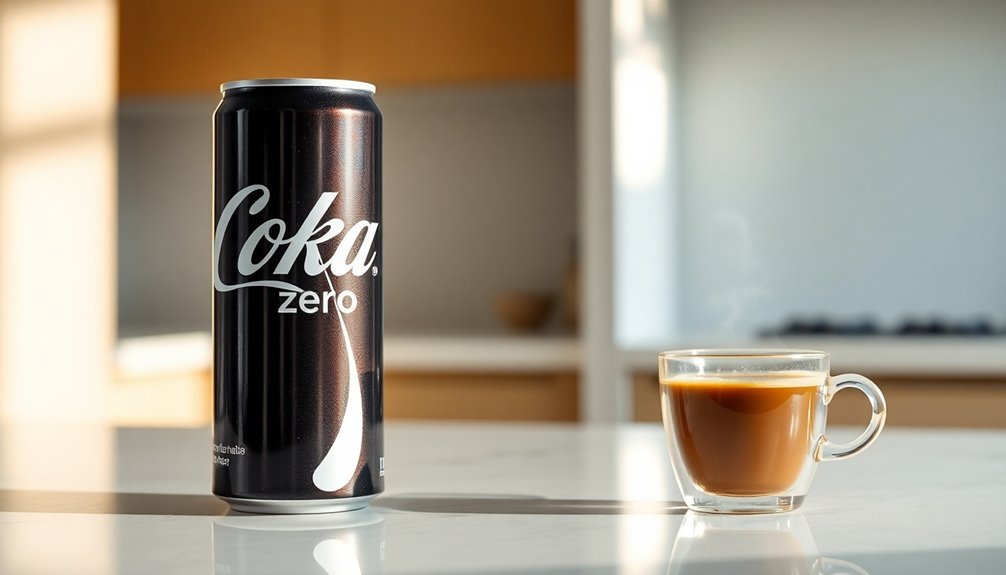
Coke Zero, now officially Coca-Cola Zero Sugar, offers a revitalizing alternative for those seeking the classic cola taste without the calories.
Launched in 2005, it quickly became popular among health-conscious consumers. With zero calories and a flavor profile mimicking traditional Coca-Cola, Coke Zero caters to those managing weight control.
The drink uses artificial sweeteners, specifically aspartame and acesulfame potassium, which are FDA approved, allowing you to enjoy sweetness without added sugar.
Each 100ml contains approximately 9. 6mg of caffeine, making it a suitable choice for those looking for an invigorating drink with a caffeine kick. Caffeine can improve focus and its appeal has inspired various flavor variants, capturing the attention of younger consumers who appreciate a guilt-free indulgence. Moreover, the unique blend of spices in chai tea not only enhances its flavor but also complements the caffeine boost, making it an enjoyable experience for tea enthusiasts. With a balanced caffeine content in chai tea, consumers can savor their drink without the jitters often associated with higher caffeine beverages. As more people seek alternatives to traditional coffee, chai tea’s rich taste and moderate caffeine levels have positioned it as a popular choice for those wishing to elevate their beverage choices.
Caffeine Content Comparison

When comparing caffeine content across popular beverages, you'll find that Coke Zero offers a milder option than many coffee choices. A 12 oz can of Coke Zero contains about 34 mg of caffeine, considerably less than the 95 mg in an 8 oz cup of brewed coffee.
If you prefer something with a bit more caffeine, regular Coke has around 39 mg per 12 oz can, while Diet Coke tops it off with about 46 mg.
Overall, soda like Coke Zero generally has 2-4 times less caffeine than brewed coffee, making it a gentler choice for your caffeine intake.
Health Considerations of Caffeine
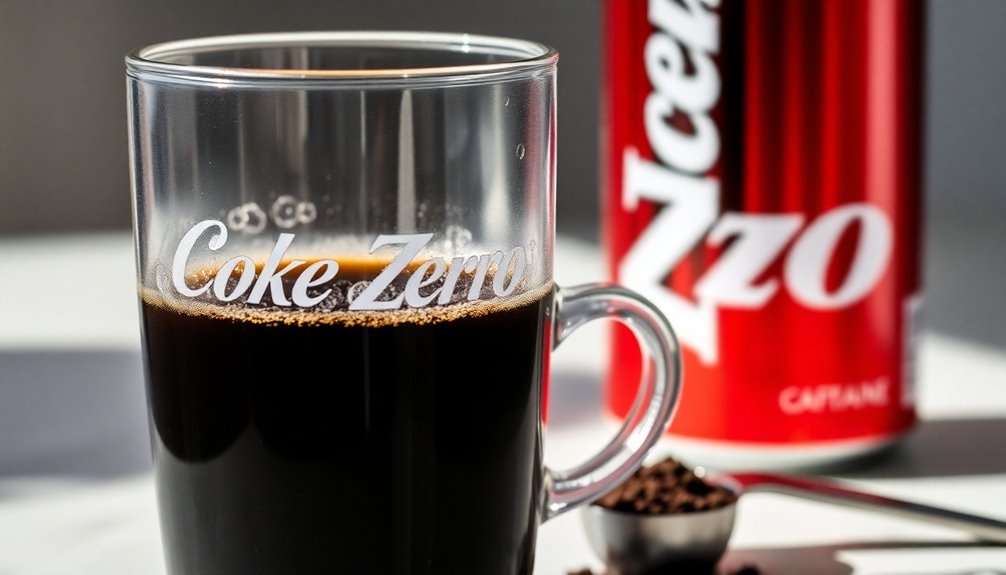
Understanding the health considerations of caffeine is important, especially if you enjoy beverages like Coke Zero. While moderate caffeine intake is generally safe for most adults, the Federal Drug Administration recommends limiting your daily caffeine to about 400 mg. Here's a breakdown of potential effects:
| Caffeine Intake | Health Benefits | Side Effects |
|---|---|---|
| Moderate (up to 400 mg) | Improved alertness | Insomnia |
| Excessive (over 400 mg) | Possible mood boost | Anxiety, nausea, headaches |
| Low (under 100 mg) | May aid metabolism | Minimal side effects |
| Varies by individual | Potential cognitive boost | Increased heart rate |
Keep in mind that excessive caffeine consumption can lead to adverse reactions, so monitoring your own sensitivity is essential.
Benefits of Caffeine
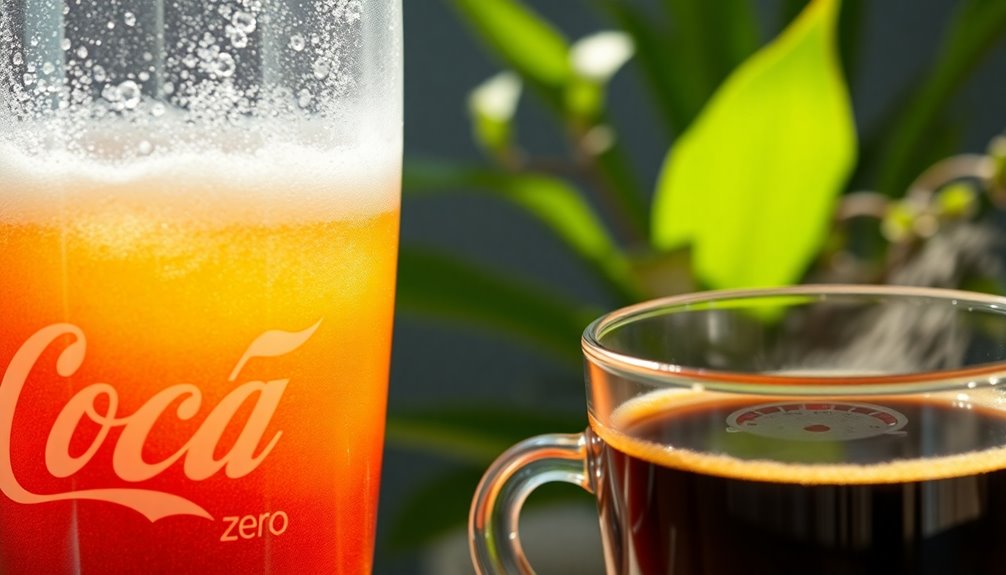
Although many people associate caffeine primarily with its stimulating effects, it offers a range of benefits that can enhance your overall well-being. For healthy adults, consuming caffeine can improve mood, attention, and cognitive performance by blocking adenosine in the brain.
The amount of caffeine found in beverages, like Coke Zero, can also boost your metabolic rate and aid in fat oxidation, supporting weight management. In addition, caffeine enhances exercise performance by increasing endurance and reducing perceived effort during workouts.
Studies suggest that regular caffeine consumption may lower the risk of neurological diseases such as Parkinson's and Alzheimer's due to its neuroprotective effects. Moreover, it's often included in over-the-counter medications, enhancing their effectiveness for pain relief and respiratory conditions. Additionally, incorporating a balanced breakfast, like the Tomato Basil Farro Egg Bowl, can complement caffeine's benefits by providing sustained energy throughout your day.
Risks and Side Effects
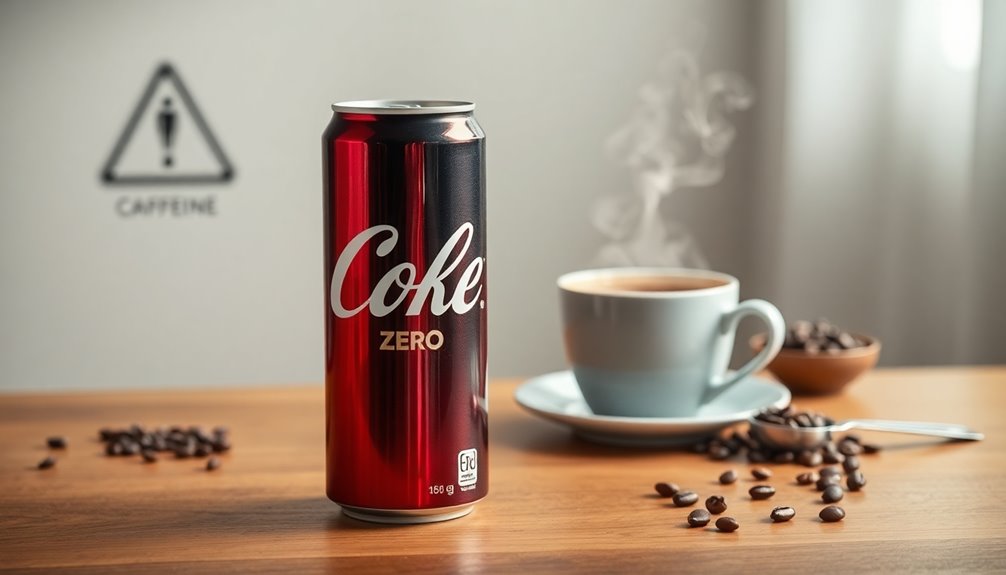
Caffeine can provide a quick boost, but it's important to be aware of the risks and side effects associated with consuming drinks like Coke Zero. With approximately 34 mg of caffeine per 12 oz can, it's lower than coffee, but still poses risks with excessive consumption.
| Caffeine Levels | Side Effects | Risks |
|---|---|---|
| 34 mg (Coke Zero) | Anxiety | Insomnia |
| 95 mg (Coffee) | Headaches | Increased heart rate |
| Varies by person | Sensitivity to caffeine | Dependency |
Moderate consumption is key; the FDA suggests limiting intake to 1-2 cans daily. Remember, individual sensitivity to caffeine varies, so keep an eye on how it affects you.
Caffeine in Other Beverages
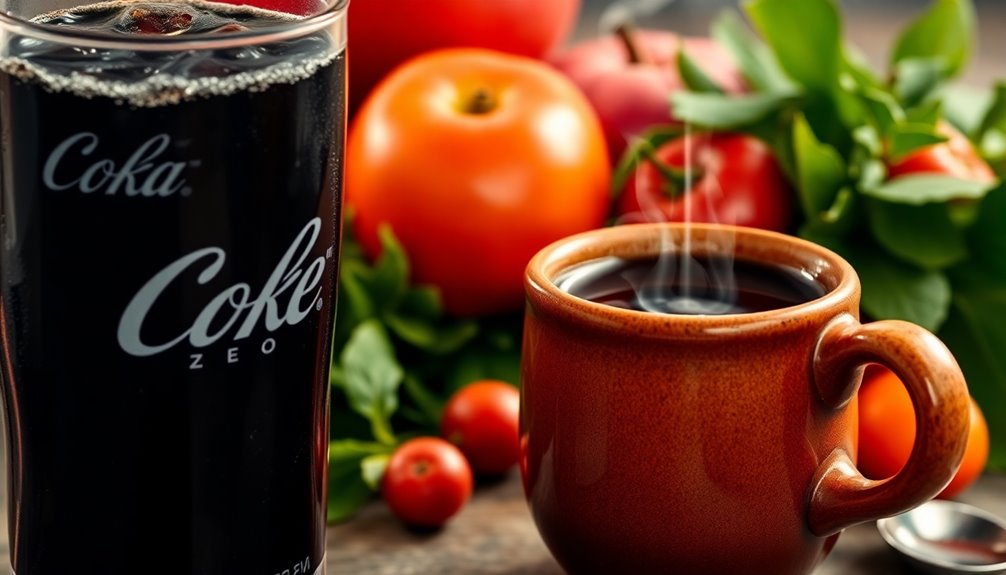
When you compare caffeine levels across different beverages, you'll notice some striking variations.
For instance, while Coke Zero has about 34 mg of caffeine, a typical cup of brewed coffee packs nearly three times that amount.
Understanding these differences can help you make informed choices about your caffeine intake and its potential health effects.
Caffeine Content Comparison
Many people might be surprised to learn that Coke Zero contains considerably less caffeine compared to other popular beverages. For instance, while a 12 oz can of Coke Zero contains about 34 mg of caffeine, a standard cup of coffee packs a punch with approximately 95 mg. Here's a quick comparison of caffeine content in various drinks:
| Beverage | Caffeine Content (mg) |
|---|---|
| Coke Zero | 34 |
| Regular Coke | 39 |
| Diet Coke | 46 |
| Double Shot Espresso | 60-100 |
As you can see, Coke Zero contains much less caffeine than coffee and even less than regular Coke. Soft drinks generally have lower amounts of caffeine per serving, making them a milder option.
Health Implications of Caffeine
Understanding the caffeine content in beverages like Coke Zero can help you make informed choices about your consumption. While Coke Zero has about 34 mg of caffeine per 12 oz serving, it's considerably lower than coffee, which averages around 95 mg per 8 oz.
This difference can have various health implications, especially if you're monitoring your caffeine intake.
Consider these points:
- Coke Zero has less caffeine than regular Coca-Cola (39 mg).
- Energy drinks can pack a punch with 80-300 mg of caffeine.
- Tea generally contains 30-50 mg of caffeine, depending on the type.
- Dark chocolate offers 12-25 mg per ounce.
- Be mindful of added sugar in these beverages.
Interestingly, detoxifying juices can be a healthier alternative to high-caffeine beverages, providing essential nutrients without the jitters.
Making smart choices about caffeine can benefit your overall health!
Final Thoughts on Caffeine
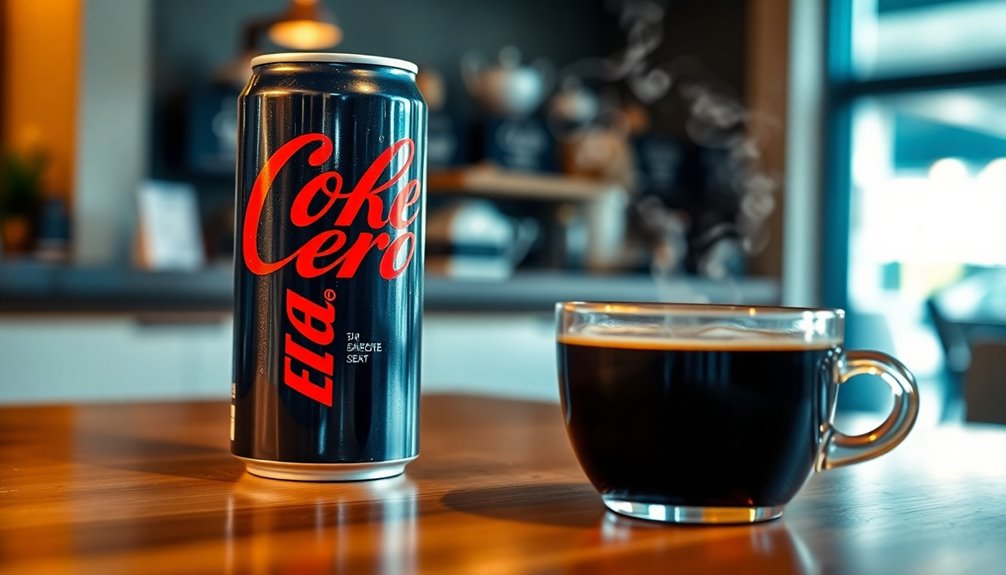
While Coke Zero offers a satisfying cola experience with less caffeine than coffee, it's vital to evaluate how this affects your overall caffeine consumption.
With about 34 mg of caffeine per 12 oz can, Coke Zero contains considerably less than the 95 mg found in an 8 oz cup of brewed coffee. This lower dosage means it provides a milder energy boost, which can be beneficial if you prefer a lighter caffeine option.
However, regular consumption can still contribute to your daily caffeine intake, so moderation is essential to avoid potential side effects.
Frequently Asked Questions
Is There More Caffeine in Coke Zero or Coffee?
When you compare caffeine levels, you'll find that coffee packs a much stronger punch than Coke Zero.
A typical 8 oz cup of brewed coffee contains between 80 to 175 mg of caffeine, while a 12 oz can of Coke Zero has only about 34 mg.
So, if you're looking for a caffeine boost, coffee's definitely the better choice.
Coke Zero simply can't compete with coffee's higher caffeine concentration.
Is Coke Zero Better for You Than Coffee?
When you're weighing Coke Zero against coffee, think of them as two different paths in a forest.
Coke Zero offers a calorie-free, sugar-free option, but it lacks the natural goodness of coffee, which brims with antioxidants.
While Coke Zero might seem like a revitalizing choice, coffee's potential health benefits can't be ignored.
Ultimately, it depends on what you value more: a fizzy lift or a sip of nature's brew.
You can't go wrong!
What Soda Has the Most Caffeine?
If you're curious about which soda packs the most caffeine, Jolt Cola takes the crown with around 71.2 mg per 12 oz serving.
Mountain Dew and Pepsi One follow closely, both containing about 55 mg.
If you're looking for a bit less, Diet Coke has 46 mg, while regular Coca-Cola offers around 34 mg.
How Many Cans of Coke Zero Can You Drink a Day?
Crisp, caffeinated cans can be tempting, but consider your consumption!
You can safely sip on 1-2 cans of Coke Zero each day to avoid caffeine overload. If you're sensitive to caffeine, you might want to stick to just one.
Remember to factor in all your caffeine sources, too. Too much can lead to restless nights or jittery days, so keep it moderate and mindful for your well-being!
Conclusion
In the caffeine showdown, Coke Zero packs less of a punch than your average cup of coffee, but it still gives you a little boost. While it can help perk you up, remember that moderation is key. You don't want to bite off more than you can chew when it comes to caffeine. So, whether you choose Coke Zero or coffee, just keep an eye on your intake and enjoy the benefits without the jitters!


